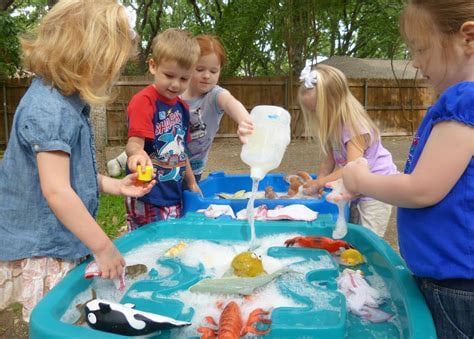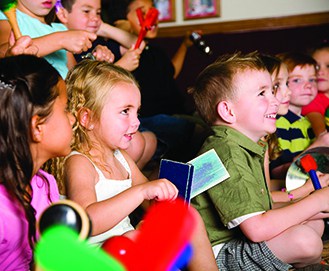Why Music Lessons Might be Helpful for Child Development
We’ve discussed ways to get your little one involved in extracurricular activities and one of the ideas mentioned was playing an instrument. Playing an instrument can do a lot of good for your little one. There are a multitude of benefits such as the development of physical and social skills, patience and discipline and a boost in self-esteem.
Physical skills are improved, as certain instruments require movement to be played. Drums require coordinated arm and leg action while violins entail simultaneous movement from both hands. Instruments help develop ambidexterity as well an improvement in coordination.
Social skills can also be improved through music lessons. If it is a group music lesson, then teamwork and communication are required to play as said member of the group. Children need to understand their particular role in the larger ensemble to create music.
Patience and discipline also play a large role in learning to play an instrument. Discipline is used in habitual practice of the instrument. Patience is required, as one will not master an instrument immediately. Many instruments have a steep learning curve. For example, before an instrument can even be played, one has to know how to read music notes.
As a child learns to play an instrument, self-esteem is built. Constructive criticism and the slow progress of getting better will teach your child that hard work pays off.
At Minnieland Academy, children gather to create music, sing songs, clap and dance each day. Age appropriate musical instruments are available in our classrooms.
Continue reading “Why Music Lessons Might be Helpful for Child Development”
Why Is It Important for Your Child to Play?
We all want our kids to enjoy their childhood and explore many different things. We want them to be interested in books. We want them to explore modern technology. We want them to go outside and appreciate nature.
There are so many scenarios in which children can blossom and play, and although we often deem playing as leisure activity, there is more to it than that. Play is, in fact, one of the most important things a child needs to do during their development.
Below are a few reasons why playing is so important for children:
- Play helps them learn how to get along with other kids. When your child has a playmate, they learn how to socialize with other kids and how to deal with different social situations. It is very important to their social development and fluency.
- It builds imagination. What’s more fun than pretending you are the king or queen of your own kingdom or an explorer finding treasure? When children are allowed to create a world of their own, their imaginations expand, which serves them in all other aspects of their lives as they grow older.
- It promotes physical development. There is actually a lot of physical activity involved in playing, which helps kids develop better balance, eye-and-hand coordination, and strength.
- They become team-oriented. Your child will be more at ease when working with other people and will learn to value teamwork and hard work in order to achieve their goals. For instance, if they want to build a small house, they need to work together and divide the responsibilities to bring it to life.
- Play is exercise. Your child becomes more active, which leads to better health.
- They learn. There is so much to learn when children play. Their motor skills are developed, and they can learn concepts that they see in books or from school like colors and shapes.
- They develop confidence. With obstacles to face and new skills to learn, children build confidence when they achieve small successes, whether physically or in their minds.
- Play is fun. Who wouldn’t want their children to have fun? Childhood happens quickly, so it is important for children to get to fully experience it, laugh, and feel free.
Basic Outdoor Safety Tips to Keep Your Child Safe
The outdoors are great for your children. It gives them fresh air, sunshine, and overall better health. They can play with their friends and run around, which keeps their bodies active. They can explore your yard and gardens and use their imaginations to create fun scenarios in their heads.
There are so many things that the outdoors can offer, but safety is not always guaranteed. In order to let your kids play outside without worrying about them, here are some basic safety tips you should keep in mind:
- Do not let them play outside without adult supervision. Even if you don’t join them in playing, keeping a watchful eye can save them when danger arises.
- Teach your child never to go beyond the fence. It is important that your child understands that rule and follow it strictly.
- Always lock the gates. There is no need for your child to open the gates and get out of your yard.
- Remove any hazardous, sharp, or electrical materials from their play area. These are potential sources of dangers.
- Apply sunscreen during summer and proper warm clothing in winter. Always dress your child appropriate based on the season, so they do not become overheated or develop a cold from being too chilled.
- Equip your child with a safety helmet and kneepads when riding bicycles, skateboards, or other moving toys.
- Keep outdoor tools and equipment in sheds or away from your children. Bring your gardening tools and barbecue grills inside if possible.
- Inspect their play area. Is all play equipment working fine? Is there any damage on the seesaw, monkey bars, or swing? Check it out to see if there are possible sources of accidents.
- Allow your child to play only on equipment appropriate for their age. Certain equipment like monkey bars is not safe for toddlers for example..
- Watch them closely when they’re swimming in the pool. Never leave them unattended.
- Remove or section off plants that could be potentially hazardous to their health. Educate them on what they should and should not touch.
How To Choose Age-Appropriate and Safe Toys
 Few things give your child more joy than a new toy (except for maybe the box that it came in…). Toys help to create a vast colorful world of endless wonder and make-believe you and I can no longer really “see”.
Few things give your child more joy than a new toy (except for maybe the box that it came in…). Toys help to create a vast colorful world of endless wonder and make-believe you and I can no longer really “see”.
Unfortunately, toys today may also pose a threat if not selected properly. There are toys that unsafe and not appropriate for the age of our children. It is important for us to scrutinize toys we want to give our children first, before handing them over.
Here are some tips on how you can choose age-appropriate and safe toys for your children:
- Check the package- Toys come with an age recommendation and some with safety instructions, be sure to read these instructions first to prevent injury. There are toys that are only ideal to 6 years old and above since these contain small parts that little ones can swallow.
- Evaluate its durability- Is it strong enough not to easily break? It is a risky to have toys that can easily shatter into pieces and cause its small parts to scatter around or scratch your child.
- Look for safe ingredients- You can find what makes up a toy in its own packaging. Check the ingredients and see if there are hazardous elements!
- See if it is educational and developmentally appropriate- We want our kids to not just have fun, but also learn from their toys. Today there are ample toys available that are developmentally appropriate for your child’s age.
- Choose simple toys- The simpler they are, the wider the imagination of your kids when playing. Toys that are too specific offer less room for the imagination as everything is already set out for them.
- Give one toy at a time- Give your kids time to enjoy the a few toys first, so they will really maximize the enjoyment of those toys. While an argument can be made that one can never have too many toys – too many at once for a child can be less than ideal.
- Understand the learning needs of your child based on his age- For instance, children who are 2-4 years want to stimulate their imaginations, while babies from 6-8 months do well with repeatable activities.
- Be careful with electronic toys- Toys that are powered through batteries and electricity are risky to children especially toddlers and babies. They can try to plug and unplug or even taste the batteries.
Helping Your Child in Decision Making
 Candy, TV Shows, Toys and even what to wear, there are a lot of things a child CAN make choices on. Oftentimes, we do the choosing for our children and sometimes we just give in to what they want the first time… not always the best option.
Candy, TV Shows, Toys and even what to wear, there are a lot of things a child CAN make choices on. Oftentimes, we do the choosing for our children and sometimes we just give in to what they want the first time… not always the best option.
Kids will not be able to do well in decision making unless we help them to begin thinking for themselves with small decisions from an early age.
Children who are well-verse in aspects of decision-making early on, grow up to become smart and responsible adults with an increased sense of cause and effect. Since they know how to properly choose for themselves and stick to their decision, they are able to think more critically in all of life’s decisions.
Though kids will only have to decide on things such as; toys, games and food, it all starts small. Below are some ways on how you can help them in decision making:
- Reduce their options for them. You may not decide for them but you can make it easier at the start. Help them decide better by limiting their options to where they can comfortably choose. Sometimes, too many options will only confuse them, adding a sense of pressure.
- Let them make decision even if you think they will choose incorrectly. What your kids need to learn is to know that they can make mistakes sometimes. There is no perfect circumstance thus they do not need to be perfect all the time. The mistakes they do sometimes make can help them become stronger and more self-reliant as they mature.
- Be an example for them. Kids will always try to follow what adults do. Live the kind of life that you want your kids to have. If you want them to be wise in making decisions, set an example for them.
- Help them get a clear picture. Children do not have enough experience to identify which is a good decision or situation and which is not. Help them decide better by creating a clear picture for them of what will happen if they choose this and that. This will help to further teach your children the concept of cause and effect.
- Support their decision. Show kindness and support to your children and they will feel more confident. If they choose a decision, support their decision, even if it isn’t exactly what you would have chosen for them. Let them know that you are there always no matter what.
- Let them know that you trust them. Give your kids the assurance that you trust them in making a good decision. This will encourage them to not only feel confident in their decisions, but also to make the right decisions.







